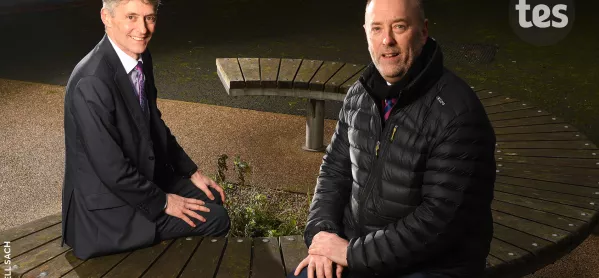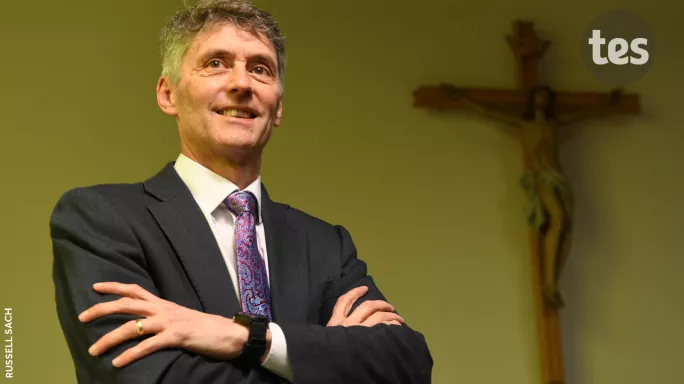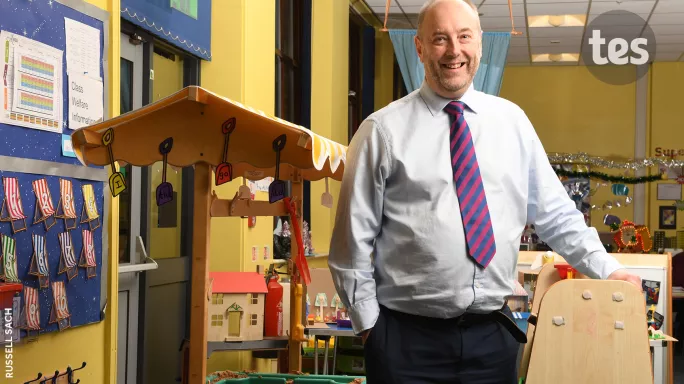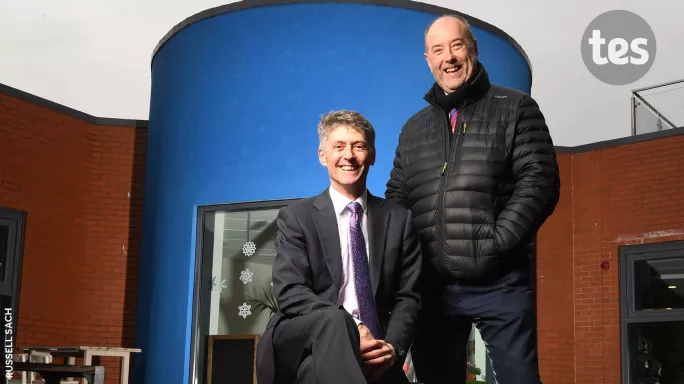- Home
- No way to live: how accountability forces teachers out
No way to live: how accountability forces teachers out

“When people say ‘What these children need is greater cultural capital’, I think: ‘Well, yes, they do, but they also need food and a warm home and a bedroom where they can get some sleep’.”
On a bitingly cold day in Blackpool, Stephen Tierney is well placed to speak about the realities of educating children in a deprived community, having devoted much of his teaching career to school leadership in the town.
But after more than 30 years in the profession - including a recent spell as chair of the Headteachers’ Roundtable national think tank - he has decided to step down as the chief executive of Blessed Edward Bamber Catholic Multi Academy Trust.
His Christmas retirement came at exactly the same time that Andy Mellor - another Blackpool head with a big national profile - also left the profession. It feels like an appropriate coincidence for two school leaders who have led bizarrely similar parallel lives.
Tes met the pair to discuss their shared loved for teaching and how the threat of Ofsted and the pressure of working with extreme deprivation during a time of austerity have led them to leave their teaching early.
Warning: Departing head warns of pernicious accountability system
Funding: Head tells of heartbreak over cuts
Poverty: The disturbing link between education and health
Both have been proud to bring their perspective as Blackpool heads to the national stage. Mellor - who has been a primary head in the Lancashire town for nearly two decades - spent 2018-19 as the national president of the NAHT headteachers’ union.
Understanding what poverty really means is all-important, according to Tierney, who points out that eight out of the 10 most deprived neighbourhoods in the country are in Blackpool.
‘People in ivory towers just don’t get it’
“Well-meaning people in ivory towers just don’t get it,” he says. “You cannot intellectualise yourself into an understanding of a place like Blackpool. It’s almost too extreme.”
These are not just soundbites. Tierney breaks off from the interview because he is co-ordinating a collection of food as part of a national newspaper’s Christmas appeal, which Blackpool schools are helping to lead.
But both heads are proud of their school and community and they object to the idea that lower results in poorer areas should be seen as an indication of a poorer standard of education.
“There are schools in this country and you can just turn up and teach and the kids are biddable,” says Mellor. “We are having to think about how to engage the kids in the first place - if you have not eaten, you have not slept, you have been subject to some sort of domestic violence case overnight, you have had your windows broken and all of that.
“I would argue you could take the educational team that works in Blackpool and put it in a far more leafy area and the schools in those areas would see the results go through the roof because we are having to do things and challenge ourselves on a day-to-day basis with the kids that we are working with far more than in any other places where I have worked.”
And this brings them on to part of the reason why they are leaving the profession - what the pressure of accountability means for schools in challenging areas.
“You work in an affluent area and you can almost trip over the standard,” says Tierney. “You live and work in an area like this and there is so much to deal with that sits before you.”
School leaders, he says, come to think that it could be only a matter of time before they fall foul of Ofsted or the latest performance measures.
Looking over your shoulder
“There is a part of me working in a community like this for ever looking over my shoulder at the accountability system, and you just end up with a crick in your neck and you just think, this is no way to live.
“So although I was in the window where people think about leaving, I am probably going earlier than I thought I would. The challenges, the pressures and the unforgiving nature of some of the systems that we have prompted it.
Mellor agrees. “It is the same attritional pressures around accountability. I think I must have redirected my school six or seven times over the course of my headship based on the way Ofsted was facing at the time.
“Ofsted tell us they are not a school improvement service, but what they are doing by default is forcing schools to adhere to a framework that they say is important and which by definition gives you a level of school improvement direction which you might not otherwise have gone down the route of.”
Tierney interjects: “They say they are a force for improvement. In places like Blackpool, you can definitely feel their force but the improvement, not so much.”
What is clear is that although both men are stepping away, their love and belief in teaching and education is undiminished. But they also feel constrained by outside factors.
Too many hard days
“I still want to have a positive impact,” says Mellor. “But you have got Ofsted with the particular direction they want to take schools in, you have got the funding situation which is constraining what you can do as a school leader and you have to let good people go.
“As a national leader of education, you are no longer able to use your skills and experience to help support a school to help that school become what you feel it could be. But instead, you have got to adhere to all the DfE’s [Department for Education] approved programmes for what you have to implement. You become a broker rather than a school improvement agent.”
Both men are keen not to talk Blackpool down and, given the chance to start their careers over, would still want to work in the same type of community.
As Tierney puts it: “I can understand people with mortgages and families thinking there are loads of other jobs out there and these jobs give far more job security. But I probably would be equally as daft, knowing what I know now about what it’s like to work in such a disadvantaged community.
“But,” he adds, “sometimes I do think: ‘Would I do it again?’

“It just gets underneath your skin. I think I would express it in a faith way. You do good work and you do God’s work. This is where I was called to be.
“It is a bit intense and there are too many hard days. But you just look and think, there is such a need here and so there is such opportunity to do good, and when I came here I was 38 and I thought I might have one or two headships and I just never left.”
The two heads come across as having very different personalities. Mellor is softly spoken and sounds sad and reflective to be leaving teaching, while Tierney speaks with great pace and intensity.
But their careers and outlook have had a striking amount in common. Both were born in the North West - in Bolton and Southport, respectively. And they have both devoted much of their career as school leaders in Blackpool, becoming prominent heads on the national stage along the way.
As young men, neither had thought they would go into teaching. Both did in part because of the example of their parents. And both became heads at 38, and both have now left the job they love at the turn of the new decade.
Teaching ‘is in the DNA of the family’
“It’s very much in the DNA of the family,” Mellor says. “But I was never going to be a teacher because I wanted to do something different.
“My dad was a head and my mum was a deputy in Blackpool, and in the end, I followed them.
“One of my sisters left to be a teacher in Dubai; my youngest sister was a teacher and has a taught all over Lancashire and is currently a head in Bolton.”
Asked why teaching appealed to him, he recalls how when he was growing up, his father worked at a residential special school and he would play with some of the pupils there.
“I would come home from school and be playing out with these kids who would be there all week. So I had a real affinity for kids for whom behaviour was an issue and there were some tough kids among all that. Having an affinity and wanting to make a difference for these kids is literally something I grew up with.”
He trained to be a teacher at a training college in Matlock and began his career in Birmingham, spending six months working at a residential special school. From there he moved to Preston, Fleetwood and then Blackpool, where he has done 17 years at St Nicholas CE Primary in Marton.

Mellor is proud to come from a teaching family but reflects on the fact that this might be coming to an end.
“I have two daughters who are 18 and one is about to be 16 and they will not go into teaching. They are absolutely adamant - because of the workload, because of the way politicians treat teachers, because of funding for the education system. They have seen the impact of Ofsted: the fact that permeates your home, it’s something you never really lose.”
And Mellor says this as someone who helped to secure an “outstanding” rating for his school at its last inspection.
This is brought home during their Tes interview in the last week of the December term, when Mellor regularly checks his phone.
“If I don’t get a call from Ofsted in the next hour then that means they are not coming this week. And I am done with Ofsted and I can put them on the back burner.” He checks again 20 minutes later.
“It’s ridiculous that it hangs over you like this, but it does.” Happily, the phone never rings.
Tierney has a similar story. He also comes from a teaching family but also never had teaching in mind.
“Dad was a draughtsman, Mum was a secretary. Neither started as teachers, neither had a degree, but both went on to night school and Open University and changed vocations to become teachers.
“When I was faffing about at university and wondering what I might do with my life, my mum suggested teaching and I remember saying - and I live to eat these words: ‘I am not going to bother teaching, it’s not challenging enough’. What a dozy pillock!”
‘When I started teaching, it clicked’
But Tierney did go into teaching, and when he stepped into the classroom, “it clicked”.
“Throughout my life, I have been a what I’d call a bottom-end top-ender,” he says. “I have been in reasonable sets all the way through, I was quite good at sports but never really brilliant at anything.
“If there was a tennis ball, I could hit it; if there was a football, I could kick it. I was decent at most things. Same academically. Decent GCSEs and I managed to do OK at A level. But teaching was the first thing I hit where I thought, actually, I am alright at this. It just got to me.”
Having graduated as chemist, he started as a chemistry teacher in Notre Dame School, Blackburn. He became head of science at De La Salle School in St Helens and then had a deputy headship in Lancaster before coming to St Mary’s.
“All the time I have ended up in quite deprived areas,” he says. “Not necessarily by design. It was just that this was the job that I fancied. And you wonder: well, actually, is there a design? Is there a plan? But it wasn’t a conscious decision.”
Like Mellor, he also references a parent working at a special school: his mother, who taught in an EBD school. He suggests this gave him an understanding of the importance of no child being left behind.

Both heads have been involved in Blackpool’s Opportunity Area programme - a national policy which looked to raise social mobility by giving selected areas funding to spend on education over three years. And both are positive about the idea of bringing together leaders in the town to make a difference. But they say it is not enough.
“What I like about the Opportunity Area, what it gets right, is that there is a sense of place,” says Tierney. The problem, he says, is what happens when the funding stops.
“People in ivory towers come from London and ask what the exit strategy for the Opportunity Area is. Well, it’s the same exit strategy as everyone else. We will stop doing it when the money runs out.
“People talk about building sustainability, but look: you either employ someone to do a job or you don’t employ them. Given the level of funding we receive, it’s not as if schools have lots of spare money kicking around to build capacity.”
Mellor, who is leaving teaching to become national wellbeing director for the Schools Advisory Service, says he will miss working across Blackpool to raise standards across other schools the most.
He tells Tes that throughout his career, he feels as if he has been able to help an increasing number of children as a teacher, head, leader of education and most recently as the national president of NAHT.
But both men are concerned that despite their work, the message about the needs of deprived communities is not always understood.
“Blackpool is an example, an extreme example of deep long term poverty,” Tierney says. “I think it screams at a government: ‘connect yourself’, because the failure to connect housing, social services, education and health is the problem.

“I occasionally manage to chat to people in government and the like and they will say, ‘Oh, we can’t even work well across our own department, never mind work with others’.
“In places like Blackpool, unless you connect across huge swathes of government - housing, social work, education, health, and you do some sort of economic uplift, which can’t just be a handout but has to be building an economic infrastructure - then things won’t change.
“We know how to improve children’s academic outcomes in schools: you make them more affluent. It’s absolutely clear what we have to do. We have just got to have fewer kids in poverty.”
Is this understood in Westminster and Whitehall? The two men fear not.
Mellor says: “I think this was best summed up in a meeting with an unnamed schools minister, which Steve and I were both at, whose lack of understanding of the challenges that you face in a place like Blackpool were typified when he said: ‘Just get the buggers to read’. He just lost his temper and says ‘just get them to read’.
“For many pupils, we have to do so much more to be able to do this.”
CV: Stephen Tierney
- Teacher training : Liverpool University
- Teacher at Notre Dame School in Blackburn
- Head of science at De La Salle School in St Helens
- Executive headteacher at St Mary’s Catholic College & Christ the King Catholic Primary School in Blackpool
- Executive director of the Blessed Edward Bamber Catholic Multi Academy Trust in Blackpool
- Chair of the Headteachers’ Roundtable group
CV: Andy Mellor
- Teacher training at Derbyshire College of Higher Education in Matlock
- Teacher at Cofton Junior and Infant School, Birmingham
- Teacher at Sherwood Primary School, Preston
- Teacher at Chaucer County Primary in Fleetwood
- Deputy head at Baines’ Endowed CE Primary School, Blackpool
- Head at St Nicholas CE Primary, Blackpool
- President of the NAHT headteachers’ union
- National wellbeing director of the School Advisory Service
Keep reading for just £1 per month
You've reached your limit of free articles this month. Subscribe for £1 per month for three months and get:
- Unlimited access to all Tes magazine content
- Exclusive subscriber-only stories
- Award-winning email newsletters



